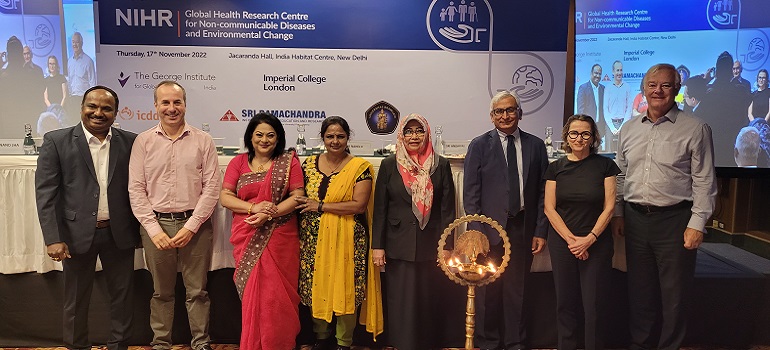The George Institute for Global Health, India and Imperial College London today announced the establishment of NIHR Global Health Research Centre on Non-Communicable Diseases and Environmental Change. The Centre will work to tackle the dual challenges of a rapidly growing burden of Non-Communicable Diseases (NCDs) and the threat of global environmental change in Low- and Middle-Income Countries (LMICs).
The launch event for the NIHR Global Health Research Centre on NCDs and Environmental Change was held on Thursday, 17 November 2022 in New Delhi, with presentations by the NIHR policy talks, multi-sectoral panel discussions and research presentations, bringing together researchers, funders community representatives, public health practitioners, policymakers and thought leaders to introduce the Centre’s mission.
“LMICs face dual, intertwined challenges of a rapidly growing burden of NCDs and the existential threat of global environmental change. Our Centre will focus on three major challenges at the interface of NCDs and environmental change – air pollution, water salinity and food systems and generate actionable evidence for improving health outcomes and reducing inequities in a cost-effective manner”, said Professor Vivekanand Jha, co-lead of the Centre and Executive Director of The George Institute for Global Health, India.
LMICs face unique challenges in delivering equitable, high-quality primary care services for the prevention and treatment of NCDs such as diabetes, kidney disease, hypertension and cardiovascular disease, and mental health. This is especially true among marginalised populations that are affected by the ongoing environmental disruption. Despite an increased recognition of a need for action there is limited evidence on cost-effective interventions to address major challenges emerging at the intersection of NCDs and environmental change in LMICs.
The NIHR Global Health Research Centre for NCDs and Environmental Change includes an interdisciplinary group of academics from the International Centre for Diarrhoeal Research (Bangladesh), Sri Ramachandra Institute of Higher Education & Research (India), and University of Brawijaya (Indonesia), who will work to address specific health concerns related to environmental change.
Research priorities have been developed with the target communities, with empowerment, engagement and outreach are the heart of the Centre’s research programme which will see local populations and primary healthcare professionals actively involved in the design, implementation and evaluation of interventions.
A key aspect of the Centre’s programme of work over the five years will be to address the urgent need to build research capacity to enable identification of effective strategies and interventions within local communities. The team will deliver a number of capacity-building activities for researchers at different stages of their careers, institutions and wider communities.
“The Centre will allow participating institutions to develop their capacity to deliver the high quality, trans-disciplinary research that policymakers and communities need to reduce the impact of climate change on health in our focus countries and beyond”, said Professor Christopher Millett, co-lead of the Centre and Professor of Public Health at Imperial College London.
The research programme will also empower communities, local populations and primary health care professionals and will be actively involved in the design, implementation, and evaluation of interventions. In addition, frontline health workers and communities will be involved in delivery of dual-benefit interventions – for example, The Woman Farmer Empowerment Scheme, which aims to sustain agriculture-based livelihoods, will be integral to the food aid intervention in India. Staff from the Centre will train groups of community members to use surveillance data to be collected for evaluation, advocacy, and accountability purposes.


